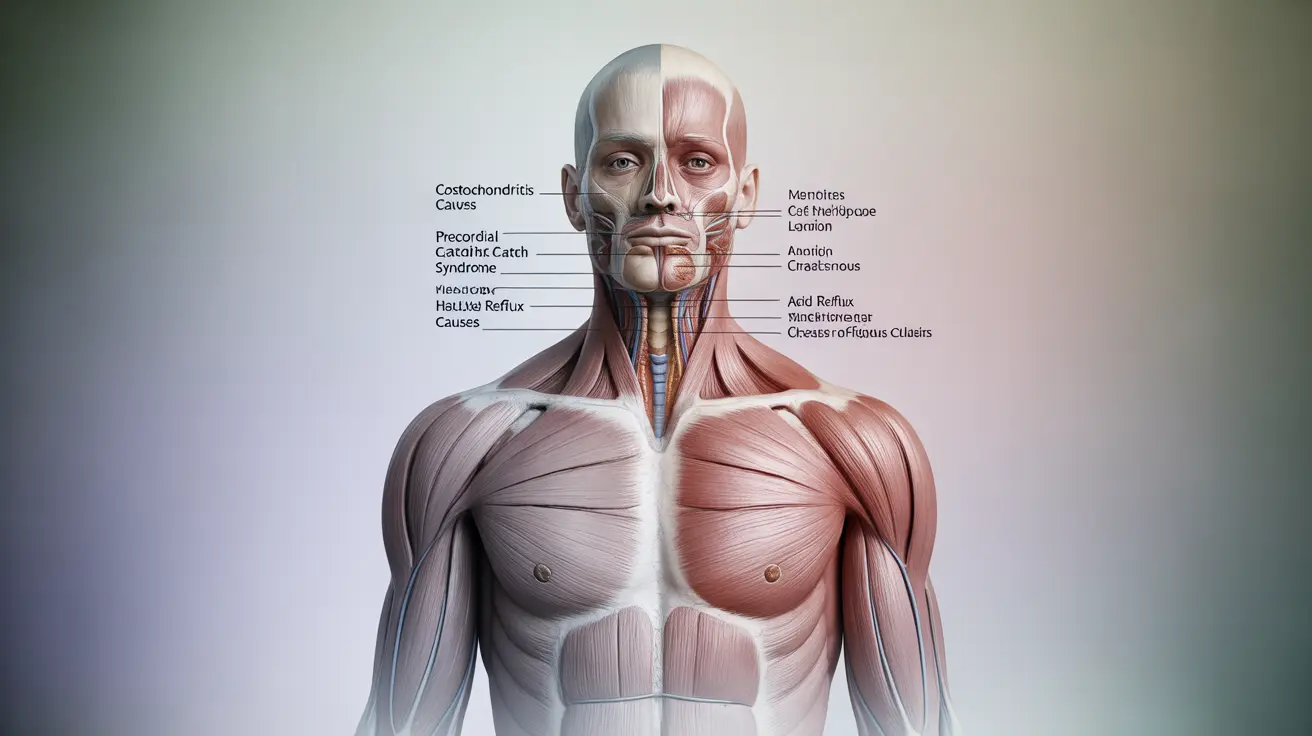Experiencing a sudden, sharp pain in your chest can be alarming, but it's important to understand that not all chest pain indicates a serious heart condition. Many common, less severe conditions can cause random sharp chest pain. This comprehensive guide will help you understand the various causes, symptoms, and appropriate responses to different types of chest pain.
Understanding Different Types of Chest Pain
Sharp chest pain can manifest in various ways and stem from multiple sources. While some causes are relatively benign, others may require immediate medical attention. Understanding these differences is crucial for proper response and treatment.
Common Non-Cardiac Causes
Many cases of sharp chest pain are not related to heart problems. Common causes include:
- Precordial catch syndrome (PCS)
- Costochondritis (inflammation of chest wall cartilage)
- Muscle strain or injury
- Acid reflux or GERD
- Anxiety or panic attacks
- Intercostal neuralgia
Muscular and Skeletal Causes
Physical activities, injuries, or poor posture can lead to chest wall pain. These conditions typically worsen with movement or deep breathing and may be tender to touch. Rest, gentle stretching, and over-the-counter pain relievers often help manage these symptoms.
Anxiety and Stress-Related Chest Pain
Psychological stress can manifest as physical symptoms, including sharp chest pain. During anxiety or panic attacks, muscle tension and heightened awareness of bodily sensations can create genuine physical discomfort. These episodes often accompany other symptoms like rapid breathing, sweating, and feelings of impending doom.
Precordial Catch Syndrome
PCS is a common cause of sharp chest pain, particularly in young adults and adolescents. It typically causes a sudden, intense stabbing sensation in a specific spot on the chest wall, usually lasting only a few seconds to minutes. Understanding its characteristics can help distinguish it from more serious conditions.
Warning Signs of Serious Conditions
Certain symptoms warrant immediate medical attention:
- Chest pain accompanied by shortness of breath
- Pain radiating to arms, jaw, or back
- Persistent pain lasting more than a few minutes
- Pain accompanied by nausea, sweating, or dizziness
- Chest pain with fever or cough
Frequently Asked Questions
What are some common causes of random sharp chest pain that are not related to heart attacks?
Common non-cardiac causes include precordial catch syndrome, costochondritis, muscle strain, acid reflux, anxiety, and intercostal neuralgia. These conditions, while uncomfortable, are generally not life-threatening.
What symptoms distinguish precordial catch syndrome from more serious heart conditions?
PCS typically causes a very localized, sharp pain that worsens with breathing, lasts briefly, and affects younger individuals. Unlike heart conditions, it doesn't usually come with other symptoms like sweating, nausea, or arm pain.
How can I manage or treat sharp chest pain caused by muscle strain or bone injuries?
Rest, ice or heat therapy, gentle stretching, and over-the-counter pain relievers can help manage musculoskeletal chest pain. Avoiding strenuous activity during recovery and maintaining good posture are also important.
Can stress or anxiety cause sharp chest pain, and if so, how can it be managed?
Yes, anxiety can cause sharp chest pain. Management techniques include deep breathing exercises, regular physical activity, stress reduction practices, and potentially counseling or therapy. In some cases, medication prescribed by a healthcare provider may be helpful.
What signs indicate that sharp chest pain might be due to a more serious condition that requires immediate medical attention?
Seek immediate medical care if chest pain is accompanied by difficulty breathing, pain radiating to the arms or jaw, nausea, sweating, dizziness, or if the pain is severe and persistent. These symptoms could indicate a heart attack or other serious condition requiring urgent treatment.




